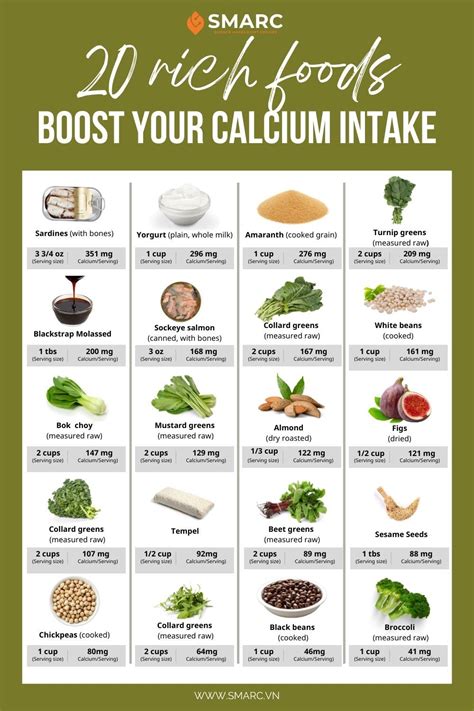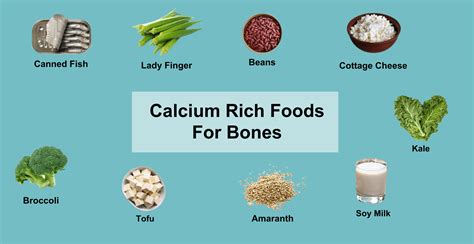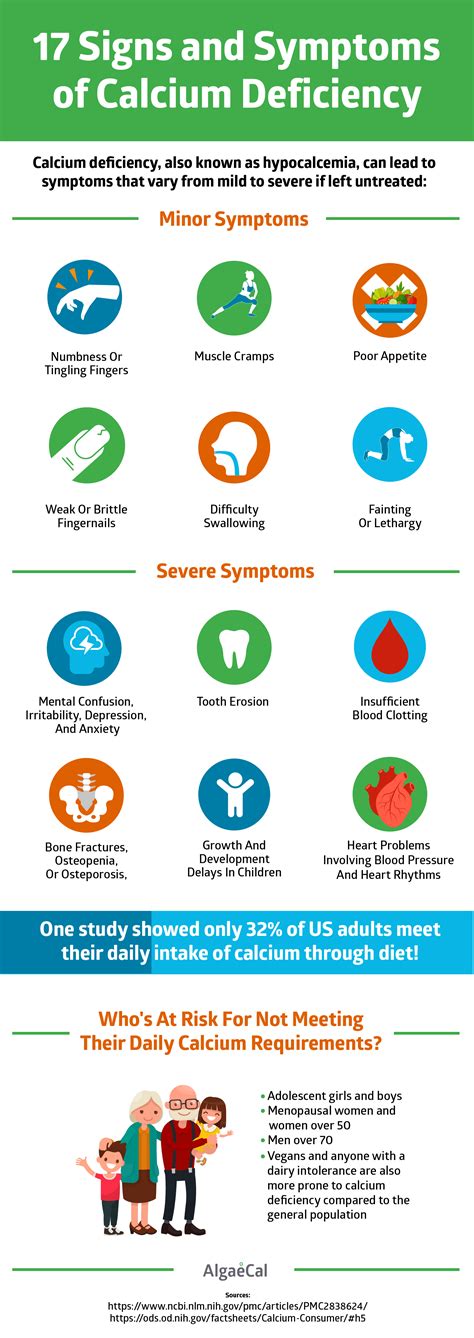Intro
Calcium is an essential nutrient that plays a vital role in maintaining strong bones and teeth, as well as supporting various bodily functions. Adequate calcium intake is crucial for people of all ages, particularly children, adolescents, and older adults. A diet rich in calcium can help prevent conditions such as osteoporosis, osteopenia, and rickets. In this article, we will explore the importance of calcium, its benefits, and the various food sources that are rich in this essential nutrient.
A well-balanced diet that includes a variety of calcium-rich foods can provide numerous health benefits. Calcium helps to build and maintain strong bones, which is essential for overall health and mobility. Additionally, calcium plays a critical role in muscle function, nerve function, and heartbeat regulation. A calcium-rich diet can also help to reduce the risk of chronic diseases, such as hypertension, diabetes, and certain types of cancer.
The recommended daily intake of calcium varies based on age, sex, and other factors. Generally, adults require around 1,000 mg of calcium per day, while children and adolescents require more. Pregnant and breastfeeding women also require higher amounts of calcium to support fetal development and milk production. It is essential to note that excessive calcium intake can lead to adverse effects, such as kidney stone formation and hardening of arteries. Therefore, it is crucial to consume calcium-rich foods in moderation and balance them with other essential nutrients.
Benefits of Calcium-Rich Foods

Calcium-rich foods offer numerous benefits, including supporting bone health, reducing the risk of osteoporosis, and promoting overall well-being. Some of the key benefits of calcium-rich foods include:
- Supporting bone growth and development in children and adolescents
- Maintaining strong bones in adults and reducing the risk of osteoporosis
- Regulating muscle function and nerve function
- Supporting heart health and reducing the risk of hypertension
- Aiding in weight management and reducing the risk of obesity
Types of Calcium-Rich Foods
Calcium-rich foods can be broadly categorized into two groups: dairy products and non-dairy products. Dairy products, such as milk, cheese, and yogurt, are excellent sources of calcium. Non-dairy products, such as leafy greens, fortified plant-based milk, and tofu, are also rich in calcium.Dairy Products Rich in Calcium

Dairy products are some of the richest sources of calcium. Some of the best dairy products for calcium intake include:
- Milk: Milk is an excellent source of calcium, with around 300 mg per cup.
- Cheese: Cheese is a rich source of calcium, with around 200-300 mg per ounce.
- Yogurt: Yogurt is a good source of calcium, with around 300-400 mg per cup.
- Butter: Butter is a moderate source of calcium, with around 20-30 mg per tablespoon.
Non-Dairy Products Rich in Calcium
Non-dairy products can also provide significant amounts of calcium. Some of the best non-dairy products for calcium intake include: * Leafy greens: Leafy greens, such as kale, broccoli, and spinach, are rich in calcium. * Fortified plant-based milk: Fortified plant-based milk, such as soy milk and almond milk, can provide around 300-400 mg of calcium per cup. * Tofu: Tofu is a good source of calcium, with around 200-300 mg per 3-ounce serving. * Edamame: Edamame is a moderate source of calcium, with around 100-150 mg per cup.Other Calcium-Rich Foods

In addition to dairy and non-dairy products, there are several other foods that are rich in calcium. Some of these foods include:
- Nuts and seeds: Almonds, sesame seeds, and chia seeds are all good sources of calcium.
- Fish: Fatty fish, such as salmon and sardines, are rich in calcium.
- Whole grains: Whole grains, such as brown rice and quinoa, can provide moderate amounts of calcium.
- Legumes: Legumes, such as chickpeas and black beans, are good sources of calcium.
Calcium Supplements
While food sources are the best way to get calcium, supplements can be helpful for individuals who are unable to get enough from their diet. Calcium supplements come in various forms, including calcium carbonate, calcium citrate, and calcium phosphate. It is essential to consult with a healthcare professional before taking any supplements to determine the best type and dosage.Calcium Deficiency and Related Health Issues

Calcium deficiency can lead to several health issues, including:
- Osteoporosis: A condition characterized by weak and brittle bones.
- Osteopenia: A condition characterized by low bone density.
- Rickets: A condition characterized by soft and weakened bones in children.
- Hypertension: High blood pressure, which can increase the risk of heart disease and stroke.
Prevention and Treatment of Calcium Deficiency
Preventing and treating calcium deficiency requires a combination of dietary changes and lifestyle modifications. Some strategies for preventing and treating calcium deficiency include: * Increasing calcium intake through food sources and supplements * Engaging in regular exercise, such as weight-bearing activities * Maintaining a healthy weight and body mass index (BMI) * Avoiding excessive caffeine and alcohol consumptionCalcium-Rich Recipes

Incorporating calcium-rich foods into your diet can be easy and delicious. Here are some calcium-rich recipes to try:
- Grilled cheese sandwich with kale and tomato
- Spinach and feta stuffed chicken breast
- Calcium-fortified smoothie with yogurt, milk, and spinach
- Baked salmon with quinoa and steamed broccoli
Tips for Increasing Calcium Intake
Increasing calcium intake can be simple and effective. Here are some tips for increasing calcium intake: * Start your day with a calcium-rich breakfast, such as oatmeal with milk and fruit * Snack on calcium-rich foods, such as yogurt and nuts * Incorporate calcium-rich ingredients into your favorite recipes * Consider taking a calcium supplement if you are unable to get enough from your dietConclusion and Final Thoughts

In conclusion, calcium is an essential nutrient that plays a vital role in maintaining strong bones and overall health. Incorporating calcium-rich foods into your diet can provide numerous health benefits, from supporting bone growth and development to reducing the risk of chronic diseases. By understanding the importance of calcium and making informed dietary choices, you can take the first step towards a healthier and happier life.
We encourage you to share your thoughts and experiences with calcium-rich foods in the comments below. Have you incorporated calcium-rich foods into your diet? What are your favorite calcium-rich recipes? Share your stories and help others learn about the importance of calcium for overall health and well-being.
What are the best sources of calcium?
+The best sources of calcium include dairy products, such as milk, cheese, and yogurt, as well as non-dairy products, such as leafy greens, fortified plant-based milk, and tofu.
How much calcium do I need per day?
+The recommended daily intake of calcium varies based on age, sex, and other factors. Generally, adults require around 1,000 mg of calcium per day, while children and adolescents require more.
What are the symptoms of calcium deficiency?
+The symptoms of calcium deficiency can include weak and brittle bones, osteoporosis, osteopenia, and rickets. Other symptoms may include muscle cramps, numbness, and tingling.
Can I get enough calcium from food sources alone?
+Yes, it is possible to get enough calcium from food sources alone. However, some individuals may require supplements to meet their daily calcium needs, particularly if they are unable to consume enough calcium-rich foods.
Are calcium supplements safe?
+Calcium supplements can be safe when taken in moderation and under the guidance of a healthcare professional. However, excessive calcium intake can lead to adverse effects, such as kidney stone formation and hardening of arteries.
